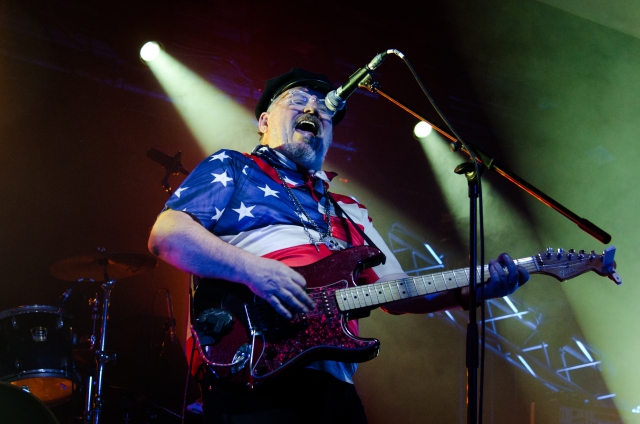
Stage Presence: JC Carroll and The Members are still out there and remain relevant, four decades after the band’s big break
You could say Jean-Marie Carroll’s musical education started in November 1970, when he caught T. Rex live at Guildford Civic Hall. Within a week, Marc Bolan and Mickey Finn had their first top-10 hit with ‘Ride a White Swan’, and the die was cast for a career in rock’n’roll for a 14-year-old soon better known as JC.
“They’d just gone electric. That was a really interesting show. At the same venue I later saw David Bowie’s Ziggy Stardust show (May ’73). Those two had a big influence. I really wanted to do stuff like that.”
After playing in various school bands, a chance meeting at The Three Mariners in Bagshot, three miles from home, with fellow future new wave star Graham Parker led to a two-track bedroom demo.
But while GP went on to the pub-rock circuit and started out on the road to international success, JC was initially consigned to working as a bank clerk and writing songs on a battered acoustic guitar in his North West London bedsit.
That proved to be the rite of passage needed though, Kilburn-based punk JC soon joining forces with a group of mates from his hometown, Camberley, and finding success.
The Members, led by Liverpool University graduate Nick Lightowlers, aka Nicky Tesco, went on to find fame with hits like ‘The Sound of the Suburbs’ (UK, No.12), ‘Working Girl’ (US, No.35) and ‘Radio’ (Australia, No.5), their take on the frustrations of suburban life soon resonating around the world, even with Bruce Springsteen.
“He came to see us in America in 1981. We were playing the Stone Pony, Asbury Park. Someone said, ‘Bruce is here. Mind if he comes backstage after the show?’ He loved The Members, we had a great chat, and he said, ‘When I come to England, I’ll invite you to our show.’ We thought, ‘Yeah, of course’. But then the invitation came.
“We sat backstage – about the size of a football pitch – with everybody who was anybody in London. Then we got a call to the Holy of Holies. He was a great guy, really identified with us, and we got to talk to him about cars and girls.”
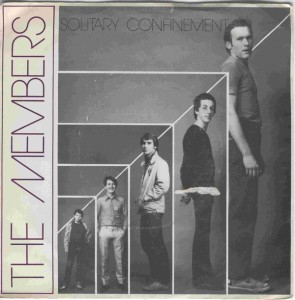 JC’s autobiographical take on bedsit life, ‘Solitary Confinement’, set the ball rolling, released by Stiff Records in May 1978. How was their brief working relationship with that esteemed independent label?
JC’s autobiographical take on bedsit life, ‘Solitary Confinement’, set the ball rolling, released by Stiff Records in May 1978. How was their brief working relationship with that esteemed independent label?
“It was really good. We went to see Dave Robinson and he asked if we wanted to put a record out, and we said yes. They had this very small office in West London, and ‘Solitary Confinement’ became a cult record, and that really helped. It was record of the week in NME and all that, and really helped launch the band.
“It was completely autobiographic. I was living in a bedsit in Kilburn, with the rest of the band in Camberley at the time. We still play that, of course, and it’s the second most-requested song we do.”
A deal with Virgin followed, and while the band story seemed to end in 1983 after three LPs, a 2007 reunion proved to be the start of a further adventure, the more recent material as critically-revered as the old.
‘The Sound of the Suburbs’, released in 1979, quickly sold 250,000 copies and went on to feature on many compilations, that year’s debut LP At the Chelsea Nightclub was recently recognised by Record Collector as one of the top 20 punk albums ever made, and financial scandals in later years led to a dusting down of fourth single ‘Offshore Banking Business’, a band with true live pedigree proving just as adept with politically-charged white reggae, and remaining as innovative and relevant today.
You can check the latest line-up out for yourselves (by yourself, on your own, by yourself, on your own … or with friends) at Blackpool’s Rebellion punk festival in early August, The Members playing Friday night, with JC delivering a solo set the previous day. And for this Lancashire-based fan, there are dates in Barnoldswick and Manchester in November too, 62-year-old JC seemingly no closer to retirement.
His career’s not just about The Members and his solo work either. He co-ran – with his first wife, fashion designer Sophy Lynn – a successful boutique, The Dispensary, in Notting Hill Gate from the late ‘80s onwards, his empire growing to four shops, becoming a gathering place for the early acid house scene, customers including Kylie Minogue, their tee-shirts and tailored clothing proving a hit.
These days, the dad-of-two is back in Surrey’s suburban heartland though, remarried – to Sheila – and also working in films and TV. What’s more, he’s working on a memoir of his busy career. So how’s the book, Same Old Boring Sunday Morning, going.
“It’s going really well. It should be finished soon, although I might be a bit late. I’m really busy, doing gigs most weekends and going to Germany to get a platinum record this Sunday. A band there, Die Toten Hosen, covered ‘The Sound of the Suburbs’ on an album that’s gone platinum. They did a whole album of their favourite punk songs, called Learning English, Lesson 2.”
Incidentally, past writewyattuk interviewees Damian O’Neill, Steve Diggle, Eugene Reynolds (with fellow Rezillos star Fay Fife) and Hugh Cornwell, along with Bob Geldof, Jake Burns, Jello Biafra, Tony James and Edward Tudor-Pole, are among the others involved. And I seem to recall, I put it to JC, John Peel was a Die Toten Hosen fan … and of your band.
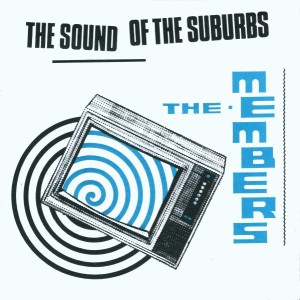 “Yes, he was a huge fan of The Members, and we did a few sessions for him (two in 1979 and one in 1981). And I was very blessed to get the chance to sit in on his programme once. I bumped into his producer, Chris Lycett, in a pub in Maida Vale, and we got in a cab and went all the way into the West End. And we never talked about music, only football, talking about Kenny Dalglish and teasing me about Chelsea! Myself and (Members bass player) Chris Payne are Chelsea supporters, and would stand in the Shed End when it was all concrete and corrugated iron in the ‘70s.”
“Yes, he was a huge fan of The Members, and we did a few sessions for him (two in 1979 and one in 1981). And I was very blessed to get the chance to sit in on his programme once. I bumped into his producer, Chris Lycett, in a pub in Maida Vale, and we got in a cab and went all the way into the West End. And we never talked about music, only football, talking about Kenny Dalglish and teasing me about Chelsea! Myself and (Members bass player) Chris Payne are Chelsea supporters, and would stand in the Shed End when it was all concrete and corrugated iron in the ‘70s.”
I caught up with JC just a couple of days after he played my hometown, Guildford, having helped put on a two-band show, The Members appearing with fellow scene veterans Eddie and the Hot Rods at the Holroyd Arms. How did that go?
“That was fantastic, and more or less sold out. A very good evening, and the venue’s really getting on the map now. It’s a really good place.”
JC lives in West Byfleet these days, 10 miles from Guildford, two miles from The Jam’s old Sheerwater base, and 13 miles from his own roots in the place with which he’ll forever be associated, Camberley. What’s more, he’s about to play his first gig in that town since 1979, playing an afternoon solo show at a town carnival. Am I right in thinking that booking had something to do with past writewyattuk interviewee, Green Man Festival creator, Buzz Club founder and accomplished singer-songwriter Jo Bartlett?
“Yes, I went to school with her big sister. Jo also grew up in Camberley, and was in a band with my younger brother for a while.”
That’ll be Rudi Carroll, ex-Bluetrain, a band I interviewed in Frimley Green in the late ’80s for my Captains Log fanzine. Not as if I ever recognised a link. Jo, these days also busy with the wondrous Kodiak Island, later told me the Bartletts and Carrolls both had six children and all went to school together. Maybe I should have asked if fellow Camberley luminaries Luke and Matt Goss were distant cousins.
Instead, JC and I briefly got on on to the Buzz Club, seeing as I’d seen the first show at The Agincourt, Camberley, in 1985, featuring That Petrol Emotion and The Mighty Lemon Drops. Some bill. And those next few years, at its West End Centre base, Aldershot, it became an essential out-of-town location for anyone interested in a happening indie scene (there’s a 2014 writewyattuk interview with Jo here, and she has her own informative, entertaining blog here). And as JC put it, “That was a really important venue at the time.”
Going back to Eddie and the Hot Rods, did you know them in the early years?
“We played with them in the ’70s, touring with them in 1979, as support, playing Guildford Civic with them early that year. And recently, we’ve done quite a few shows with them.”
And they’re still built around original front-man Barrie Masters.
“Yes, Barrie’s still there, although he’s set to retire, with just one more show next year, I believe. So this is a sort of farewell tour. That’s why I organised this show in Guildford. And he’s still brilliant. The show they did on Saturday was fantastic.”
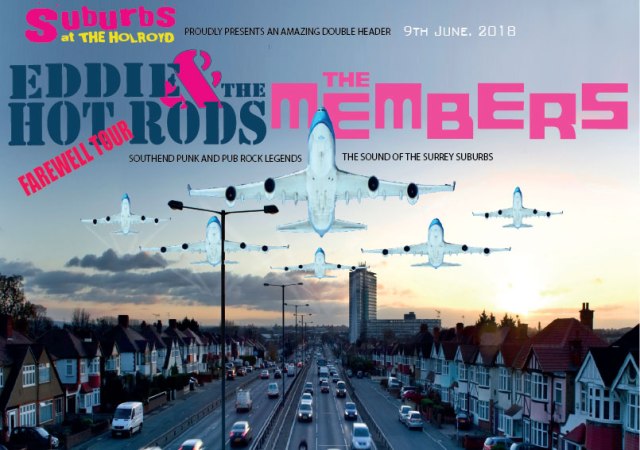 Their Summer ’77 top-10 hit, ‘Do Anything You Wanna Do’ (incidentally featured on Die Toten Hosen’s Learning English, Lesson 1, in 1991), is one of those songs that inspired so many. Only at the weekend, a Belfast listener told Tom Robinson on his BBC 6 Music show how important that was to him in those troubled times.
Their Summer ’77 top-10 hit, ‘Do Anything You Wanna Do’ (incidentally featured on Die Toten Hosen’s Learning English, Lesson 1, in 1991), is one of those songs that inspired so many. Only at the weekend, a Belfast listener told Tom Robinson on his BBC 6 Music show how important that was to him in those troubled times.
“Some people are very lucky they have songs that prove to be the zeitgeist and the sign of the times, and people can really identify with as a song of their youth and all that. ‘Do Anything You Wanna Do’ is one of those songs and was produced by the same man who produced ‘The Sound of the Suburbs’ – Steve Lillywhite, originally from Egham, Surrey.”
More about Steve – whose brother Adrian played drums for The Members – and his part in the story to come, but first, more about JC’s days since his band’s first coming. I don’t want to preempt too much of his book, but I’ll talk a bit more about his work as a composer, film and TV work, including successful projects with esteemed film/ documentary maker Julien Temple, and even accordian input on 1994’s Don Juan DeMarco, starring Marlon Brando, Johnny Depp and Faye Dunaway, and 1996’s Loch Ness, starring Ted Danson, Joely Richardson and Ian Holm.
There’s also 2011’s The Golborne Variations, involving various other Members personnel, his own co-written/directed production, described as ‘an award-winning prog-rock opera about the sounds, sights and people of a road in North Kensington – Golborne Road.’ And JC’s imdb profile lists involvement with Julien on recent release Suggs: My Life Story, 2012’s London: The Modern Babylon, and two of my favourite music documentaries, 2007’s Joe Strummer: The Future is Unwritten and 2009 Dr Feelgood biopic Oil City Confidential.
Talking of Joe, The Clash were a big influence on The Members, weren’t they?
“Yeah, we loved The Clash, and Joe was a very nice guy. I liked him a lot, and we got on very well. He was a special guy and I got to play with him a couple of times, including his birthday party just before he died. I went to his funeral. He was a really special man, very charismatic, people really loved him, and he was a natural leader and fantastic guy.
“He had a long period where he didn’t really do very much and was fed up with everything, spending about two years in a pub in Portobello Road, across the road from where I lived. I used to practise with him, and he was quite disillusioned then. But he came back, and it was great.”
I loved his later Mescaleros period. Such a sad loss that he went when he did.
“Yes, and he had another band called the Latino Rockabilly War. I did three or four shows with him then in London, with most of his band American, flying in from LA. Yeah, he did lots of interesting things, including film work with (Damned drummer and past Members contributor) Rat Scabies, and some acting. He was a complex person. I understand there’s a new retrospective coming out soon of his work, including a few loose ends.”
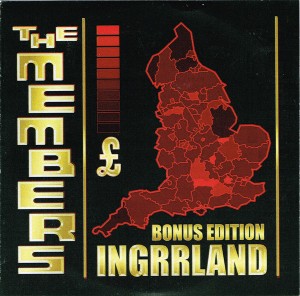 JC got to know fellow Clash players Mick Jones and Paul Simonon as neighbours too, having been based in the same area for 25 years. But let’s go back now to his own band, put together in the wake of that initial punk explosion, some 30 miles south-west of the Westway. When was the first time JC became aware of The Members?
JC got to know fellow Clash players Mick Jones and Paul Simonon as neighbours too, having been based in the same area for 25 years. But let’s go back now to his own band, put together in the wake of that initial punk explosion, some 30 miles south-west of the Westway. When was the first time JC became aware of The Members?
“I was asked to join in 1977. Nick started the band in Camberley with a guitarist called Gary Baker. They did a couple of gigs before I joined, my first with them supporting the UK Subs in Croydon, a place called the Red Deer.”
Nick initially formed the band through an invited audition at a recording studio in Tooley Street, south of the river, between London Bridge and Tower Bridge. the year before, also with Steve Morley on bass and Steve Maycock (then Clive Parker) on drums. Soon though came what was seen as the classic 1978/83 line-up, Nick (vocals) and JC (guitar) joined by Nigel Bennett (lead guitar), Chris Payne (bass) and Adrian Lillywhite (drums). Am I right in saying fellow survivor Chris predated you in the band?
“No, he joined just after, probably about a month and a half later. But the band’s had its own life in the past 10 years or so, and we’ve been together longer this second time around than the first time around. I’d say we do some 30 or 40 gigs a year now.”
Of course, Nick Tesco deserves an interview all to himself. Another fascinating bloke, with lots of tales to tell, some caught by Keef Trouble for Jack Slipper Videos in 2010, with a link to part one here. He’s not involved these days, having struggled with rheumatoid arthritis and associated problems, despite being part of the band’s initial reunion, the classic five-piece getting the ball rolling again with a show in 2007 at the Inn on the Green, near JC’s old West London patch in Ladbroke Grove.
“We’ve had some changes in the last few years, and even Chris took a tour off. I played bass when we toured America. We also had the original guitarist, Nigel, before he went back to the Vibrators, so the line-up has changed … but I’m still there.”
JC was on board early enough to play seminal punk venues like the Red Cow and the Nashville Rooms, and as I suggested to him, early tracks like Handling the Big Jets suggest to me an underlying love of US garage bands.
“Yeah, we liked surf music and liked The Shadows and stuff like that. So there’s a mixture of punk and that.”
I hear Dick Dale and The Ventures in there too.
“Yeah, we liked all that. And in the old days we always played an instrumental before Nick came on. And we still do that today.”
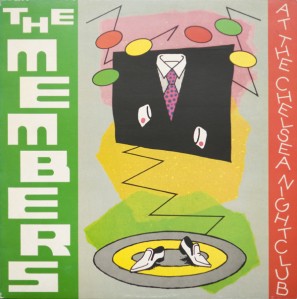 As is the case on the wonderful first album, At the Chelsea Nightclub. At this point, I tell JC that while I raved about The Undertones’ live presence, a couple of mates often told me I missed a trick in not seeing The Members on stage first time around.
As is the case on the wonderful first album, At the Chelsea Nightclub. At this point, I tell JC that while I raved about The Undertones’ live presence, a couple of mates often told me I missed a trick in not seeing The Members on stage first time around.
“We were very good live … still are … and had a lot of energy. But there wasn’t really anywhere to play around Camberley, so we hardly did any gigs at all round there. Surrey was poorly served. They had big gigs but nothing medium-sized, and until things like the Buzz Club came along there were no real places for people to play. So we would find that in 1979 we’d be touring England and playing a lot in the Midlands, but not down in Surrey.”
How important was that suburban identity to you?
“Well, let me explain to you … in the beginning the punk rock scene was quite small. And quite cliquey. There was a small group of people in London and another in Manchester, scenes of around 200 or 300 people. Then in 1978, more people became interested.
“When we started playing the Red Cow and places like that, we had groups of young men and women coming up to see us from places like Hampton and Staines and all those satellite towns, and they weren’t like that inner London clique. That was quite exciting, and we’d realise there was a whole army out there who were really ready and interested in punk rock, and they didn’t really have any songs written about them.
“That was one of the reasons I wrote ‘The Sound of the Suburbs’, to speak to those people. And we were very lucky that it came out at a time when a lot of people around the country were getting interested in punk, and it kind of spoke to them. Before then, it was just tough inner-city kids leaning against a brick wall, but we spoke about those satellite towns and living on the edges. We identified more with the suburban rather than the metropolitan.”
Even within London’s reach, it’s a similar tale, I suggested. Take for example The Kinks, who were just as much about outlying areas like Muswell Hill as Waterloo.
“Yes, as in The Village Green Preservation Society, Cricklewood, and all that. They were also just a fantastic inspiration in that they sang about ordinary people. And that mundanity made perfect sense to us.”
And while The Jam seemed to gravitate towards London too, again there was a mighty suburban influence there.
“Yes, and they did write about Woking, such as on ‘A Town Called Malice’.”
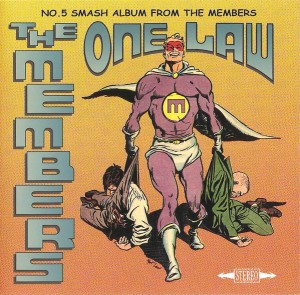 Speaking of The Jam, I see founder member Steve Brookes played on 2016’s One Law.
Speaking of The Jam, I see founder member Steve Brookes played on 2016’s One Law.
“Yeah, he did one track with me, a fantastic song, ‘Incident at Surbiton’. I saw him singing in a little pub, and people weren’t really paying attention to him. I told him I was working on a movie and asked if he wanted to help out. He did, and I then told him I had this song that was half-finished and asked him to add a vocal, and he was fantastic. He’s a fantastic singer. Better than Paul Weller. He’s got a great voice, a very malleable voice.”
Back to the book and Pledge Music campaign, crowd-funding his Same Old Boring Sunday Morning autobiography and a fourth solo LP, Painting in the Sky, the fund already having reached its target. While I’ve packed a fair bit into this feature, I’ve only really scraped the surface, and you’ll have to fork out on the book to find out more, JC’s memoir also set to include tales of Top of the Pops days, world travels, recollection of dates with Devo and the Ramones, party days, and JC’s return from a wild time in the US with $20 in his pocket in 1983, attempting to re-establish himself while taking on temping jobs, until helping launch that successful fashion company at the height of acid house.
Then there was his folk rebirth, complete with accordian, a chance meeting with a top film composer that led to a break into that world, playing with punk legends, celebrity alternative pantomime in West London, and the 50th birthday party that inspired The Members’ rebirth, the band soon back up and running and touring all over the UK, Europe, the US, Australia and New Zealand, this time without road-crew, management, or a safety net. As he puts it, it’s a story about ‘a rock’n’roll survivor, it’s got bromance, camaraderie and bitchiness, its often hilarious, sometimes sad, but never boring.’
Although he was in Kilburn when he hooked up with The Members, JC’s roots were definitely back in Camberley.
“I was born at the Frimley (Park) maternity hospital in 1956. My father worked at Blackbushe Airport, as did my mother, and they met there. When I was one, they bought a house in nearby Lightwater and I lived there until I was 18, moving to London when I left school and got a job. I was living in a bedsit in Kilburn and working as a bank clerk.”
And is that where punk rock grabbed you?
“Yeah, I got to go to the Roxy and see the Ramones, Talking Heads, all that, and later got to play with people like Glen Matlock, Dee Dee Ramone, Johnny Thunders and Rat Scabies, who we had as a drummer for three years. We had some very interesting stories from him. He’s a great raconteur and a very interesting man.”
Thinking of that Roxy link, Don Letts’ involvement with the punk scene via that Covent Garden club is well documented, with links between punk and reggae from the start. And there was a strong reggae association with The Members’ sound.
“Well, they didn’t play punk at the Roxy because there weren’t any punk records at the time, but Nick Tesco and I loved reggae and so we always had this strange mixture of reggae and punk and of fast and slow songs, at a time when not many other bands did that.”
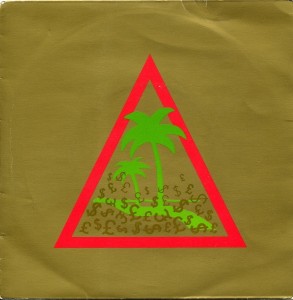 We mentioned two of your early hits, and ‘Offshore Banking Business’ also proved to have staying power.
We mentioned two of your early hits, and ‘Offshore Banking Business’ also proved to have staying power.
“Yes, with every fresh financial scandal that gets dug out, and it’s done very well for us, becoming something of a signature tune. It’s great to have those songs and play new songs as well. I always try to incorporate some of my new songs into the show, especially the solo show, trying to keep it fresh as an artist. You have to play the favourites, but there’s no harm in introducing others, and some of the newer material has turned into live favourites.”
Anyone still know you as Jean-Marie?
“Erm … not really, though my mother calls me that. It wasn’t that easy at school, having girls’ names and going to an all-boys school (Salesian College, Chertsey). A lot of people called me Jean, and I still get that at the doctor’s or the dentist’s.”
I’m guessing there’s a French link, as with Stranglers bass player Jean-Jacques Burnel.
“Yes, my father’s French, while my mother’s from Ireland.”
Do you remember clearly the day you signed to Virgin?
“I do remember a little about it. I think we signed around November 1978, gave up our jobs, and had quite a successful record then went around the world. When we were on tour they signed lots of other bands, like The Skids and The Ruts, and by the time we returned punk was no longer in fashion, while 2 Tone was. We felt like we were slightly anachronistic at the time. So it’s really strange how now it all seems to be bigger than it ever was in certain quarters, with these big festivals. I went to see The Skids the other night and they do these huge shows, while the Ruts DC are still going too.”
And like The Skids, The Stranglers, The Vapors and many more of those bands, you’re clearly not just content to live off your past.
“Yes, and there are lots of things to write about. We live in interesting times, and that’s what being in a band like The Members is about. You’ve got to write about the times you live in.”
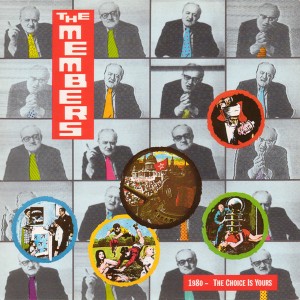 Was Adrian’s brother, Steve Lillywhite, key to your decision to sign for Virgin?
Was Adrian’s brother, Steve Lillywhite, key to your decision to sign for Virgin?
“Well, basically, we got him into Virgin. He was only just qualified as a producer. He’d only co-produced the Hot Rods’ record before Sound of the Suburbs, so hadn’t had a lot of success at that point. After working with us there, he got other gigs with them, like XTC. We gave him a step up the ladder really.”
How do you see At The Chelsea Nightclub today?
“It was a very good record, and we didn’t really do very much to it. We just played it like we played live. It wasn’t over-produced.”
It certainly has that live, fresh feel.
“Steve put loads of little tricks on the single version of ‘The Sound of the Suburbs’, like acoustic guitars and sound effects, and that was a fantastically-produced record. But subsequently, whenever it was licensed, for greatest hits albums and so on, they used the album version, which was inferior. For many years you couldn’t get the single version. But last year I managed to license it back from Universal, who currently own it, and put out this new Greatest Hits compilation, spanning our long career, and it’s gone down really well, with some very good reviews. And it’s made me very happy that it said the new material was as strong as the old.”
While the follow-up, 1980’s The Choice is Yours failed to have the same impact, I grew to love – and still do – the final album first time around, Going West. What I hadn’t realised until fairly recently was that it had a US release first. And there’s always been that strong interest in the band in America.
“Yes, it was called Uprhythm Downbeat in America, and the album was produced by Martin Rushent, who at the time had a worldwide No.1 with The Human League’s Dare. As a result, they gave him his own label and told him he could sign whoever he wanted, and he promptly signed The Members and Pete Shelley. We had to make the record the same way he made his Human League record, brick-by-brick, using drum machines and electronic loops.”
I had that album on vinyl, on the Albion label, and it always seemed to be a really loud record.
“It was probably cut very loud and produced very loud. Martin pressed everything so everything sounded really loud.
“But there are two versions of ‘Working Girl’, one which we did earlier with Steve Lillywhite and one by Martin Rushent, which was a big hit for us in America. And that’s what we’re known for out there. There was also a big disco song called ‘Radio’, which was …”
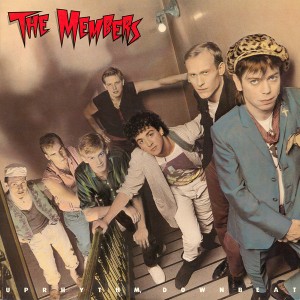 … A big hit in Australia, yeah?
… A big hit in Australia, yeah?
“Yes, and also about five years ago two DJs remixed it and re-cut it up, having a huge dance hit with it, renaming it ‘Radio Stereo’.”
Did you get to tour in Australia as well?
“Yeah, we did, in 1979, as soon as we had a hit here, our managers sent us to America and Australia and New Zealand. And we went back three years ago and had a fantastic tour there. And as well as 2014 we spent a lot of time in America in the ’80s, doing loads of touring. So yes, we keep on touring around the world.”
Am I right in thinking someone used it as a jingle on Radio 1 back in the day, possibly Kid Jensen?
“Yes, we did station idents for a lot of people, including Kid Jensen. We did about 10.”
Obviously, you couldn’t dream of replicating the success you had in those days. The record sales just aren’t there now to the same level. But if you had the chance to steer new fans back to the more recent albums in your second coming, where should they start?
“I’d pick one of the most recent ones, because they’re the ones I’ve got on the merch stand! There’s One Law (2016) and Ingrrland (2012) for a start. You can hear them online. We cart them around and still sell them at gigs. That’s what you do today.
“We’re also recording new material at the moment, for an American label called Cleopatra, so there’s a new album in the pipeline, which is exciting. And we’re very lucky to still be working.”
For more details of JC’s book project, head to his Pledge Music link. He also has his own website.
2018 dates: Lewes Con Club (with Johnny Moped), July 16; Camberley International Festival (solo), June 23; Redhill Ska B Q, July 13; Guildford Suburbs (solo), July 14; Reading Readipop (with Dawn Penn, Don Letts), July 15; Cardiff The Globe (with Vice Squad), July 20; Islington Hope & Anchor (solo/book launch), July 26; Blackpool Rebellion Acoustic Stage (solo), August 2; Blackpool Rebellion Opera House, August 3; East Sussex Byline Fest, August 28; Bedford Squires, September 1; Swindon Victoria (with Charred Hearts), September 22; Rotherham Cutlers Arms, September 29; Stoke-on-Trent Brown Jugg, September 30; Skegness Great British Alternative Festival, October 7; Barnoldswick Music and Arts Centre, November 8; Glasgow Ivory Black’s, November 9; Edinburgh Bannerman’s, November 10; Balcombe Club (solo), November 24; Manchester Star & Garter, November 25; Norwich Waterfront (with UK Subs), December 7; London 100 Club, December 22. For more details, and the latest from The Members, head here. You can also keep in touch via Facebook and Twitter.

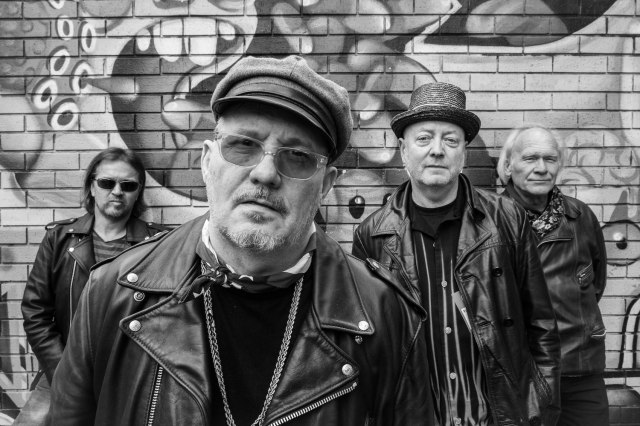
Pingback: Where the Solid Gold Easy Action is – in conversation with Gordon Gibson | writewyattuk
Pingback: Hold tight, now we’re on our own – the Fay Fife interview | writewyattuk
Pingback: The Members – The Star and Garter, Manchester | writewyattuk
Pingback: Looking back at 2018. Part one – the first six months | writewyattuk
Pingback: Live and Direct in Guildford – back in my hometown revisiting The Star, the Boileroom and the Holroyd | writewyattuk
Pingback: The Members / Blow-Up – Preston, The Continental, Friday 4th February 2022 | writewyattuk